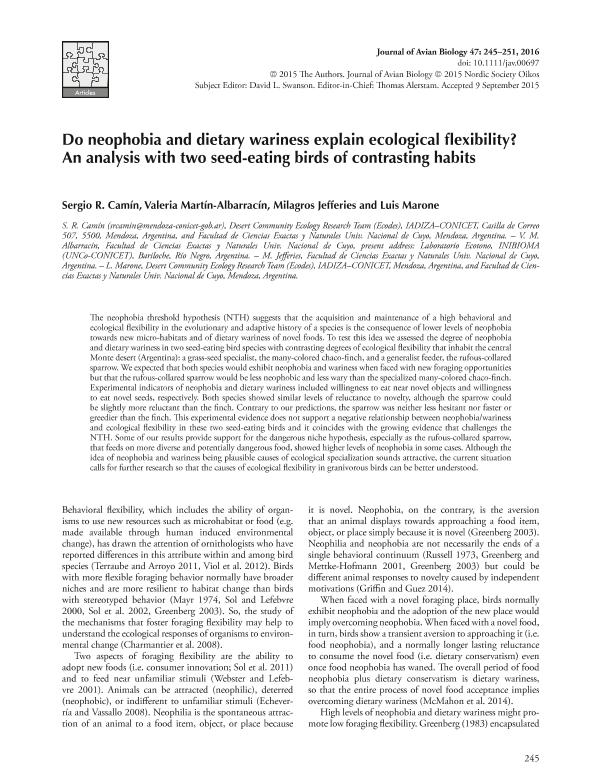Mostrar el registro sencillo del ítem
dc.contributor.author
Camín, Sergio Ramón

dc.contributor.author
Martin Albarracin, Valeria Leticia

dc.contributor.author
Jefferies, María Milagros

dc.contributor.author
Marone, Luis

dc.date.available
2018-05-18T20:11:28Z
dc.date.issued
2016-03
dc.identifier.citation
Camín, Sergio Ramón; Martin Albarracin, Valeria Leticia; Jefferies, María Milagros; Marone, Luis; Do neophobia and dietary wariness explain ecological flexibility?: An analysis with two seed-eating birds of contrasting habits; Wiley Blackwell Publishing, Inc; Journal Of Avian Biology; 47; 2; 3-2016; 245-251
dc.identifier.issn
0908-8857
dc.identifier.uri
http://hdl.handle.net/11336/45648
dc.description.abstract
The neophobia threshold hypothesis (NTH) suggests that the acquisition and maintenance of a high behavioral and ecological flexibility in the evolutionary and adaptive history of a species is the consequence of lower levels of neophobia towards new micro-habitats and of dietary wariness of novel foods. To test this idea we assessed the degree of neophobia and dietary wariness in two seed-eating bird species with contrasting degrees of ecological flexibility that inhabit the central Monte desert (Argentina): a grass-seed specialist, the many-colored chaco-finch, and a generalist feeder, the rufous-collared sparrow. We expected that both species would exhibit neophobia and wariness whenfaced with new foraging opportunities but that the rufous-collared sparrow would be less neophobic and less wary than the specialized many-colored chaco-finch. Experimental indicators of neophobia and dietary wariness included willingness to eat near novel objects and willingness to eat novel seeds, respectively. Both species showed similar levels of reluctance to novelty, although the sparrow could be slightly more reluctant than the finch. Contrary to our predictions, the sparrow was neither less hesitant nor faster or greedier than the finch. This experimental evidence does not support a negative relationship between neophobia / wariness and ecological flexibility in these two seed eatingbirds and it coincides with the growing evidence that challenges the NTH. Some of our results provide support for the dangerous niche hypothesis, especially as the rufous-collared sparrow, that feeds on more diverse and potentially dangerous food, showed higher levels of neophobia in some cases. Although the idea of neophobia and wariness being plausible causes of ecological specialization sounds attractive, the current situation calls for further research so that the causes of ecological flexibility in granivorous birds can be better understood.
dc.format
application/pdf
dc.language.iso
eng
dc.publisher
Wiley Blackwell Publishing, Inc

dc.rights
info:eu-repo/semantics/openAccess
dc.rights.uri
https://creativecommons.org/licenses/by-nc-sa/2.5/ar/
dc.subject
Neophobia
dc.subject
Wariness
dc.subject
Flexibility
dc.subject
Granivorous
dc.subject.classification
Otras Ciencias Biológicas

dc.subject.classification
Ciencias Biológicas

dc.subject.classification
CIENCIAS NATURALES Y EXACTAS

dc.title
Do neophobia and dietary wariness explain ecological flexibility?: An analysis with two seed-eating birds of contrasting habits
dc.type
info:eu-repo/semantics/article
dc.type
info:ar-repo/semantics/artículo
dc.type
info:eu-repo/semantics/publishedVersion
dc.date.updated
2018-04-18T17:52:45Z
dc.journal.volume
47
dc.journal.number
2
dc.journal.pagination
245-251
dc.journal.pais
Reino Unido

dc.journal.ciudad
Londres
dc.description.fil
Fil: Camín, Sergio Ramón. Consejo Nacional de Investigaciones Científicas y Técnicas. Centro Científico Tecnológico Conicet - Mendoza. Instituto Argentino de Investigaciones de las Zonas Áridas. Provincia de Mendoza. Instituto Argentino de Investigaciones de las Zonas Áridas. Universidad Nacional de Cuyo. Instituto Argentino de Investigaciones de las Zonas Áridas; Argentina
dc.description.fil
Fil: Martin Albarracin, Valeria Leticia. Universidad Nacional de Cuyo. Facultad de Ciencias Exactas y Naturales; Argentina. Consejo Nacional de Investigaciones Científicas y Técnicas. Centro Científico Tecnológico Conicet - Patagonia Norte. Instituto de Investigaciones en Biodiversidad y Medioambiente. Universidad Nacional del Comahue. Centro Regional Universidad Bariloche. Instituto de Investigaciones en Biodiversidad y Medioambiente; Argentina
dc.description.fil
Fil: Jefferies, María Milagros. Universidad Nacional de Cuyo. Facultad de Ciencias Exactas y Naturales; Argentina. Consejo Nacional de Investigaciones Científicas y Técnicas; Argentina
dc.description.fil
Fil: Marone, Luis. Universidad Nacional de Cuyo. Facultad de Ciencias Exactas y Naturales; Argentina. Consejo Nacional de Investigaciones Científicas y Técnicas. Centro Científico Tecnológico Conicet - Mendoza. Instituto Argentino de Investigaciones de las Zonas Áridas. Provincia de Mendoza. Instituto Argentino de Investigaciones de las Zonas Áridas. Universidad Nacional de Cuyo. Instituto Argentino de Investigaciones de las Zonas Áridas; Argentina
dc.journal.title
Journal Of Avian Biology

dc.relation.alternativeid
info:eu-repo/semantics/altIdentifier/doi/http://dx.doi.org/10.1111/jav.00697
Archivos asociados
